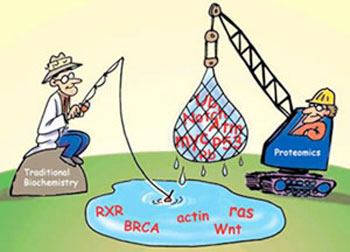However, proteomics is much more complicated than genomics. This is because while an
organism's genome is more or less constant, the proteome differs from cell to cell and
from minute to minute depending on the activity of specific genes. This makes
interpreting a protein measurement difficult.
Whereas genomic studies of cancer usually require tumor tissue, proteomic studies
mostly look at proteins circulating throughout the body. So these studies can be
conducted using blood, urine or other body fluid samples.
A breakthrough in cancer treatment was the discovery that tumors "leak" proteins and
other molecules into blood, urine, and other accessible bodily fluids.
This insight has led to the possibility of diagnosing cancer at an early stage simply by
collecting such fluids from patients and testing them for the presence of cancer-related
molecules, also called "cancer biomarkers/tumor markers". The greatest promise for the
early detection and treatment of cancer lies in the ability to find valid molecular
indicators, or biomarkers, of the disease.
- Problems in Using Proteomics
Although protein biomarkers hold great promise in our fight against cancer, there are
significant challenges that must be overcome:
- Lack of standardization - Today, laboratories across the country collect, store,
and study proteins in different ways. This lack of standardization makes it
difficult to accurately compare results from one laboratory to another and limits
the number of cancer protein or biomarker tests that are available to the public.
- The huge numbers of proteins that exist in the body make it difficult to identify
and characterize.
- Proteins are continually moving and undergoing changes. All of these actions
and/or interactions need to be better understood.
- Proteins exist in a wide range of concentrations in the body. The most important
proteins for understanding and/or detecting cancer may be those found in the
smallest concentrations, which means being able to detect them is a major
problem.
- Most tests today have problems with false positives and false negatives.
- Possible Solutions to Problems in Proteomics
- Scientists have proposed that in order to develop more sensitive and specific
cancer diagnostic tests, many biomarkers should be measured simultaneously.
| |
|
|
 |
|
It is thought that patterns revealed in a
panel of biomarker proteins associated
with a form of cancer - known as a
"protein signature" - might have better
diagnostic and predictive capabilities than
the current single-marker approach. |
| Image courtesy of Purdue University, Dr. W. Andy
Tao |
|
|
- Standardize collection and testing of samples
Summary:
Diseases such as cancer, while based on genomic mutations, show up as problems in
protein signaling. Pharmaceutical interventions aim to fix the faulty protein activity, not
the genetic defect.
3) Metabalomics
Metabolomics is the systematic study of the unique chemical fingerprints that specific
cellular processes leave behind. More specifically, it is the study of metabolic responses
to drugs, environmental changes and diseases.
Metabolomics is an extension of genomics (concerned with DNA) and proteomics
(concerned with proteins). Following on the heels of genomics and proteomics,
metabolomics may lead to more efficient drug discovery and individualized patient
treatment with drugs, among other things.
| |
|
|
 |
|
Not all metabolites can be found in any given
tissue or biofluid.
Most often the biological samples used to
measure metabolites are urine, saliva, and
blood plasma.
While genomic data and proteomic analyses
do not tell the whole story of what might be
happening in a cell, metabolic profiling can
give an instantaneous snapshot of the
physiology of that cell. This may be very
helpful in all areas of disease detection and
treatment. |
| |
| Image courtesy of Royston Goodacre School of Chemistry, The University of Manchester |






